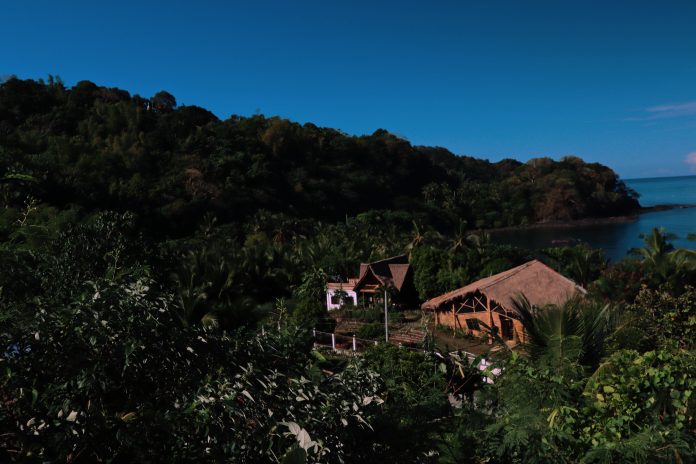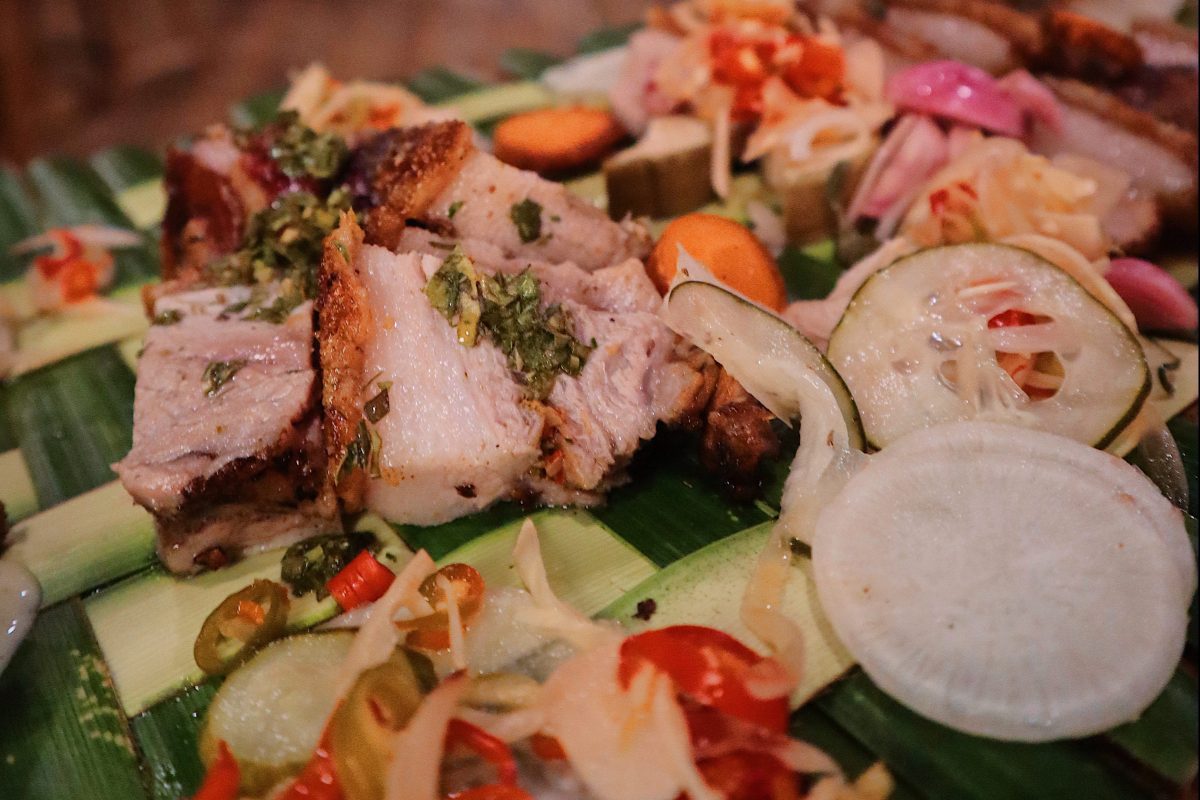
A STRIKING bamboo bungalow – in itself a marvel of local carpentry – that defies all convention of what thatched cottages should look like, complemented by interiors that highlight the craftsmanship of Antiqueño artisans.
A seasonal organic menu dedicated to reintroducing the region’s diverse homegrown produce with bold new flavors.
A permaculture garden that nurtures everything from indigenous medicinal plants to mustasa and parsley to red okra, squash, and more.
A pristine beachfront. A heart for zero-waste green living. And probably the best tuba harvests on this island.
Nestled between the rugged coastline of Antique and the storied upland forests of Dao is the promising Alpas – a beachfront enclave of sustainable lifestyle, environmental conservation, and delectable locally-sourced food – shaking up the otherwise sleepy town of Tobias Fornier, 28 kilometers away from San Jose de Buenavista and 98 kilometers from Iloilo City.
Championed by the passionate couple of chef Ken Cazeñas and Kimberly Eng – and just a few hundred meters away from the iconic rock formations of Puntahagdan – Alpas borrows its name from one of the “most beautiful words in the Philippine language,” a Tagalog expression meaning “to become free or break loose.” More than being a restaurant and guesthouse, Ken and Kimberly envision Alpas as a place where like-minded people can gather to enjoy and engage.
By coincidence or by fate, the bean-shaped floor plan of Alpas’ restaurant is evocative of what the couple seeks to foster on their ¾ hectare land: plant the seed of and cultivate a socially- and environmentally-conscious culture and hopefully encourage it to bud, grow, and spread – seeing this region as fertile ground for the change they want to nurture.
Both hailing from the United States, Ken being of Antiqueño descent but raised in San Francisco and Kim being Chinese-American, the couple moved to Barangay Paciencia, Tobias Fornier, Antique nearly a year-and-a-half ago determined to make a difference in the hometown of the former’s parents. After more than a decade in the culinary industry, jumping around from Los Angeles to San Francisco to Hong Kong, the duo set their eyes on the former beach resort of Ken’s aunt, seeing its potential to become a haven for all the ideals they stood for.
BEACHFRONT HAVEN
Entering the Alpas compound, one is immediately drawn to an imposing all-bamboo structure – it’s asymmetric frame and wide windows inspired by the iconic Ibuku architecture of Bali, Indonesia. Aiming to show the resilience, versatility, and beauty of bamboo as a sustainable building material, Ken and Kim collaborated with local carpenters early last year to design and create the impressive project from scratch.
“Bamboo is severely under-valued and underestimated,” explained Kim. “Though it’s the most viable indigenous building material here in the Philippines, there’s very little interest toward it. There’s a need to invest more resources towards innovating and improving our methods of bamboo harvest, treatment and construction in this country.”
“Bamboo grows plentifully here, concrete does not. We should figure out better ways to use this incredibly strong and sustainable building material,” she added, citing how architects in Bali have shaped a whole industry on green building initiatives and the treatment and care of bamboo.
Stepping into the restaurant, one is stunned by how large the 65-seat hall is from the inside. Ready to welcome guests are tables and chairs fashioned from driftwood and bamboo, all crafted by local artisans. Hanging from the ceiling are light fixtures that evoke fish and crab traps. The thatched cogon roof provides plenty of natural insulation, lending a cool air to the space.
At the heart of it all is a tall brick hearth where chef Ken does all his culinary magic, choosing to cook entirely using wood fire as to not be reliant on LPG and propane burners, as well as infuse a rare smokiness to his meat dishes.
Chef Ken, who has trained for years under world renowned chefs such as Mako Tanaka of Los Angeles and celebrity chef Wolfgang Puck, is passionate about highlighting the beautiful diversity of indigenous herbs, fruits, livestock and plants unique to the Philippines – all the while adhering to sustainable practices.
Ken has a penchant for elevating local favorites and the homegrown harvests of Antique, crafting exquisite organic dishes unparalleled in this region. Alpas boasts a seasonal menu that changes daily depending on the ingredients Ken finds at the local market, as well as from their own garden, devoted to fresh quality produce and free-range native livestock.
The Antiqueño chef takes pride in coming up with a new slate of dishes every day to dazzle diners. His exquisite concoctions range from grilled rockfish with herb paste and clams roasted in tuba and sweet pepper salsa, to chopped roasted ham and pork shoulder and sautéed pumpkin, to hand-pressed mushroom and bamboo shoot sushi with pickled ginger.
All of these dishes are served on beautiful nito and bamboo plates topped with banana leaf, along with rustic coconut bowls, and wooden planks that provide an earthy vibe to your dining experience.
To avoid food waste, Alpas even pickles and ferments their own produce, as well as smoke their own meats.
A typical lunch at Alpas consists of a salad (topped with an herb vinaigrette made by the chef from scratch) and a savory entrée paired with rich brown rice, grilled vegetables and their tasty pickled sitao. For dinner, Alpas serves a full-course meal with some yummy pudding and native latik or Ken’s other adventurous creations for dessert. The meal is always paired with the restaurant’s chilled garden teas (among them a lemongrass, ginger, and tamarind blend, as well as a roselle and native oregano mix).
Alpas’ signature cocktail is the batuan and tamarind cocktail which has gin and tuba freshly-harvested from the property.
However, the restaurant’s hidden gems are their refreshing bottles of tuba, collected every day with the insight and help of the expert local mananguete, or tuba harvester. Alpas’ tuba is leagues away from the tuba of our lolos, fizzy and sweet, it’s an intoxicating yet delicious treat to cap off a hearty meal.

SUSTAINABLE, ZERO-WASTE
Unwavering in their goal of not contributing to the trash being dumped into landfills and the ocean, Ken and Kim have adopted a broad-gauged lifestyle that really looks at every aspect of Alpas’ operation, making it probably the first and only truly plastic-free and zero-waste establishment in the region.
Alpas composts all their non-meat food scraps to then use in their garden, fruit peels and picked leaves and stems are fed to their goats. Even bones are crushed and burned to ash to be used as a fertilizer. The property also has its own compost toilet, with friendly instructions for those using it for the very first time. The toilet uses rice hull collected from farmers in their neighborhood and carbonized at Alpas.
Ken and Kim’s passionate objective has led to them supporting and working with other local like-minded environmentally-conscious ventures, sourcing produce from a handful of social enterprises and featuring their products at the restaurant and giftshop, celebrating Philippine-made ingredients, materials, and crafts.
Alpas sources black, red and brown SRI rice from ZIDOFA (Zarraga Integrated Diversified Organic Farmers Association), a Sinag Accelerate awardee of the Bank of the Philippine Islands Foundation, recognized for empowering farmers in rural Iloilo by introducing them to the organic-based system of rice intensification, which produces a higher yield.
Ken and Kim only buy free-range native pork from Green Warrior Eco-Farm in Barbaza, Antique, while supporting sustainably-caught seafood from fishermen in neighboring Anini-y (line-caught or spear-caught only, averse to net fishing which may be dangerous to ecosystems with its careless bycatch).
Alpas also supports the Buri Weavers Association of Diclum in Tobias Fornier, collaborating with Curimae Soapworks for all-natural handmade soap, House of Ekolife for freshly-roasted, Philippine-grown, fair trade coffee, Ariana Coco for Virgin coconut oil, Lilet’s Mushroom Farm in Patnongon, Antique, and Bertolano Organic Farm in Sibalom, Antique, among others.
“When you dine with us, you’re supporting a community and [not just] your health,” said Kim. “To be connected with what you consume and to know where it came from is a wonderful thing and we wish to provide that experience for you. We hope the list keeps growing as more neighboring farmers and suppliers are encouraged to grow and raise organic produce and livestock.”

CULTIVATING CHANGE
The couple admits that the move to Antique wasn’t easy, settling in the largely rural and traditional Tobias Fornier, trying to make a significant change in people’s culture is an uphill battle. Just to give you an insight into how set in their ways the neighborhood may be, Dao was renamed Tobias Fornier in 1978, yet most locals still prefer using the old name to this day.
Adamant in their goal, Ken and Kim may have even ruffled a few feathers as they begun their journey. Aiming to revitalize and clean their beachfront a year or so ago, the couple decided to disallow fishermen from the neighboring towns to dock at their stretch of sand, as they were the main culprit when it came to littering along this beach.
They event posted a large sign saying “The sea gives us fish but we give it trash.” This angered a barangay official leading to a confrontation and mediation, where Kim and Ken where ultimately declared in the right. The couple has since combed the beach everyday to rid it of trash and other debris, realizing a pristine beach guests can appreciate. Even marine life in the area has slowly begun thriving again.
Just this January, Ken and Kim called out the local government for habitually failing to collect the town’s garbage.
“It’s not cool when you can count on two fingers the amount of times garbage has been collected over the course of 1.5 years [in our town],” expressed Kim, explaining that 90 percent of the trash they needed disposed were the public beach trash they collected along the coast. “We do our part in making every effort to refuse single-use plastics in our every day operations and even ask our guests to pack up their plastics with them when they leave. We’ve lived here for more than a year, how many times has trash been collected by the waste department? Twice. How many times have we talked to the local government? Too many times to count.”
The furor got the attention of Sen. Loren Legarda’s team who personally visited and dined at Alpas, lauding the couple’s commitment to zero-waste sustainable living and calling it a “must-visit place for tourists.”

WORTHY DETOUR
In the Michelin Guides, a revered mark of distinction in the culinary world, a “one star” Michelin rating is awarded to bistros in recognition of the high quality of its cooking. On the other hand, two Michelin stars are often awarded to restaurants worth a detour, indicating excellent cuisine worth getting off the beaten path for.
Chef Ken, as irreverent as he is, probably doesn’t see Michelin stars as the be-all-end-all for the craft that he is so passionate about, but this is what my long preamble is trying to say: Alpas is very much worth a detour, maybe even worth a trip of its own as a gastronomical pilgrimage of sorts.
Alpas now also hosts cooking classes every Wednesday, inclusive of ingredients, a free lunch, and the invaluable insight and instruction of chef Ken. They are also slated to host a Yoga retreat on March 2 to 3, set to coincide with an organic mushroom tasting menu. Located in Barangay Paciencia, Tobias Fornier, Antique, Alpas is open Wednesday to Sunday, serving lunch and dinner. You can find Alpas on Facebook at facebook.com/alpashere. Relish newfound sustainable island life at Alpas./PN







